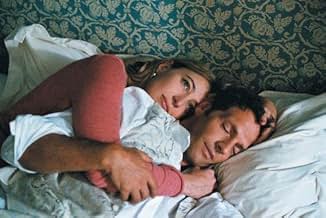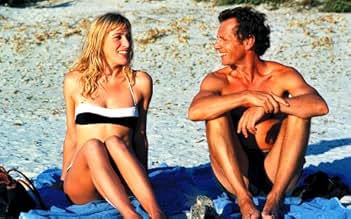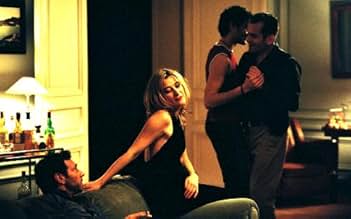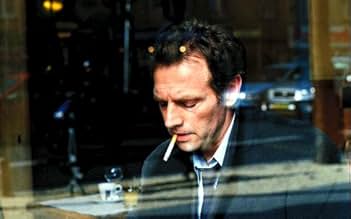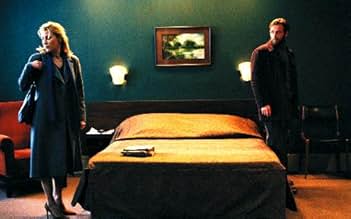IMDb-BEWERTUNG
6,6/10
10.684
IHRE BEWERTUNG
Fünf Phasen in der Romanze zwischen einer Frau und einem Mann.Fünf Phasen in der Romanze zwischen einer Frau und einem Mann.Fünf Phasen in der Romanze zwischen einer Frau und einem Mann.
- Regie
- Drehbuch
- Hauptbesetzung
- Auszeichnungen
- 1 Gewinn & 2 Nominierungen insgesamt
Valeria Bruni Tedeschi
- Marion
- (as Valeria Bruni-Tedeschi)
Ninon Brétécher
- Sophie
- (as Ninon Bretecher)
Empfohlene Bewertungen
The end and beginning of the love of the French couple Marion (Valeria Bruni-Tedeschi) and Gilles (Stéphane Freiss) is disclosed backwards through five moments in their lives:
1st moment: They divorce and have one last brutal intercourse without love.
2nd moment: With their relationship shaken, they have a dinner party with Gilles's gay brother Christophe (Antoine Chappey) and his younger mate, when an infidelity is disclosed at the dinner table.
3rd moment: The troubled pregnancy of Marion and the delivery of their premature son Nicolas, with the total absence of Giles.
4th moment: Their wedding, when Marion commits adultery with an unknown guest of the hotel.
5th moment: .When they meet each other in an Italian resort and begin their relationship.
This simple and realistic movie recalls "Irreversible" (2002), since the screenplay discloses five moments of the relationship of a couple chronologically backwards. I believe the first intention of François Ozon is to remember that behind every divorce, there is a couple that loved each other in the past, that decided to marry each other expecting to live together and raise a family of their own. However, relationships usually deteriorate and time destroys everything including love. In these fragmented glimpses of the lives of Marion and Gilles, the viewer does not see exactly when their love ended, but after their initial encounter, there are many signs suggesting the beginning of the end: the adultery of Marion in the wedding night; the absence of Gilles in the birth of his son; his consented participation in an orgy in the presence of Marion, visibly showing one sort of last attempt to save their empty marriage. Further to the good screenplay, the outstanding and strong performances of the sexy Valeria Bruni-Tedeschi and Stéphane Freiss give the credibility to the characters. My vote is seven.
Title (Brazil): "Amor em 5 Tempos" ("Love in 5 Times")
1st moment: They divorce and have one last brutal intercourse without love.
2nd moment: With their relationship shaken, they have a dinner party with Gilles's gay brother Christophe (Antoine Chappey) and his younger mate, when an infidelity is disclosed at the dinner table.
3rd moment: The troubled pregnancy of Marion and the delivery of their premature son Nicolas, with the total absence of Giles.
4th moment: Their wedding, when Marion commits adultery with an unknown guest of the hotel.
5th moment: .When they meet each other in an Italian resort and begin their relationship.
This simple and realistic movie recalls "Irreversible" (2002), since the screenplay discloses five moments of the relationship of a couple chronologically backwards. I believe the first intention of François Ozon is to remember that behind every divorce, there is a couple that loved each other in the past, that decided to marry each other expecting to live together and raise a family of their own. However, relationships usually deteriorate and time destroys everything including love. In these fragmented glimpses of the lives of Marion and Gilles, the viewer does not see exactly when their love ended, but after their initial encounter, there are many signs suggesting the beginning of the end: the adultery of Marion in the wedding night; the absence of Gilles in the birth of his son; his consented participation in an orgy in the presence of Marion, visibly showing one sort of last attempt to save their empty marriage. Further to the good screenplay, the outstanding and strong performances of the sexy Valeria Bruni-Tedeschi and Stéphane Freiss give the credibility to the characters. My vote is seven.
Title (Brazil): "Amor em 5 Tempos" ("Love in 5 Times")
10meitschi
As another reviewer before me, I also can't believe how badly people are writing about this film here. I adore Francois Ozon and I've seen all his feature-length films. This one seems quite different from the others (except, maybe, Sous le sable) and it's as low-key as Ozon could ever get, but it is still an excellently scripted and played film that makes one think.
I didn't consider the backwards structure to be gimmicky at all, it rather helped the viewer to better make out flaws early in the relationship. There is betrayal in each one of the episodes, starting with the last (chronologically the first) one. The film shows us that even little egoisms and uncharitable behavior can lead to grave consequences - in this case, to divorce. The woman, Marion, seems to be easily led anywhere, not having enough standing of her own, while the man, Gilles, seems to be egoistic, cowardly and sometimes just simply sex-crazed.
I think the structure rather helps us to understand the characters better, since we have already seen the consequences of their actions and attitudes. I didn't consider the large gaps between (and also in) the episodes to be a problem - they only acknowledge that the whole story can never be told because it is made up by every single moment between their first meeting and the last time they see each other. These episodes can only indicate what went wrong, they cannot explain - that would be too simplistic.
The actors were excellent, especially Valeria Bruni-Tedeschi. The way the looks of the main characters changed during the film (becoming more and more youthful and fresh as the story goes backwards), was also excellently done.
The parallel love stories (between Gilles's brother and his young lover, and between Marion's parents) shed some more light on the relationship between Marion and Gilles - also on what might have gone wrong.
This film should probably be required viewing for every couple wanting to get married... :-) Not in order to deter them, but rather to make them aware of the pitfalls of relationships and married life.
I didn't consider the backwards structure to be gimmicky at all, it rather helped the viewer to better make out flaws early in the relationship. There is betrayal in each one of the episodes, starting with the last (chronologically the first) one. The film shows us that even little egoisms and uncharitable behavior can lead to grave consequences - in this case, to divorce. The woman, Marion, seems to be easily led anywhere, not having enough standing of her own, while the man, Gilles, seems to be egoistic, cowardly and sometimes just simply sex-crazed.
I think the structure rather helps us to understand the characters better, since we have already seen the consequences of their actions and attitudes. I didn't consider the large gaps between (and also in) the episodes to be a problem - they only acknowledge that the whole story can never be told because it is made up by every single moment between their first meeting and the last time they see each other. These episodes can only indicate what went wrong, they cannot explain - that would be too simplistic.
The actors were excellent, especially Valeria Bruni-Tedeschi. The way the looks of the main characters changed during the film (becoming more and more youthful and fresh as the story goes backwards), was also excellently done.
The parallel love stories (between Gilles's brother and his young lover, and between Marion's parents) shed some more light on the relationship between Marion and Gilles - also on what might have gone wrong.
This film should probably be required viewing for every couple wanting to get married... :-) Not in order to deter them, but rather to make them aware of the pitfalls of relationships and married life.
A film that suggests a cross between Bergmans's gut-wrenching "Scenes From a Marriage" (1973) and Stanley Donen's more lighthearted "Two For the Road" (1967), mixed in a bit with that backwards "Seinfeld" episode, "5X2" (2005) is a very fine adult drama from director Francois Ozon. As the title suggests, it is comprised of five short glimpses at the doomed relationship of a handsome professional couple, Marion (Valeria Bruni-Tedeschi) and Gilles (Stephane Freiss). As in "Two For the Road," we see unchronological snapshots of this couple's failing marriage, but unlike the '67 film, rather than being given scattershot scenes from various periods, here we proceed continuously backward in time: from the divorce settlement and its rather icky aftermath, backward to one of the couple's dinner parties, back still to the birth of their premature son, on to their wedding party (and a most unusual wedding night, to put it mildly), and all the way back to one of their first meetings. Our foreknowledge that the couple's marriage is doomed makes the cracks in Marion and Gilles' relationship stand out all the clearer. Consequently, the pretty, upbeat ending is rendered bittersweet at best, with our preglimpse of what their future holds. "5X2" has been finely put together and features sterling acting down to the smallest bit players. It was especially great for me seeing that grand old actor, Michael Lonsdale (who will always be Hugo Drax for us Bond fanatics), still acting at age 74, here playing Marion's father. My only complaint, really, concerning "5X2" is that it is a bit on the short and sketchy side; perhaps a few extra scenes would have enabled us to more fully understand the characters' motivations, particularly Gilles' (and especially his no-show at his son's birth). This, for me, is the only thing that prevents "5X2" from being a perfect 10.
At 5x2 we see the course of a relationship from end to beginning. The reverse chronology of events is now a well established editing technique which almost always works and intrigues the viewer.
The personalities of both Marion and Gilles are established fairly quickly, but the reasoning behind their actions is usually explained at a later time. In fact, this shows how well written 5x2 is, because throughout all five episodes the characters of the protagonists don't change, their behavior has changed due to actions of the other part.
Both actors deliver high caliber performances and their faces write perfectly on the screen. They do create a chemistry when needed (and a lack of again when needed). Can you believe by the way that beautiful Valeria Bruni is forty years old?
The vintage Italian music adds color to the story and Ozon shows he is an accomplished director. As the movie ends he gives us one of the most idyllic scenes ever filmed.
The personalities of both Marion and Gilles are established fairly quickly, but the reasoning behind their actions is usually explained at a later time. In fact, this shows how well written 5x2 is, because throughout all five episodes the characters of the protagonists don't change, their behavior has changed due to actions of the other part.
Both actors deliver high caliber performances and their faces write perfectly on the screen. They do create a chemistry when needed (and a lack of again when needed). Can you believe by the way that beautiful Valeria Bruni is forty years old?
The vintage Italian music adds color to the story and Ozon shows he is an accomplished director. As the movie ends he gives us one of the most idyllic scenes ever filmed.
"5x2" is not the first film to explore a relationship by going backwards from its end to its beginning (Pinter's "Betrayal" comes to mind let alone the mystery in "Memento").
But writer/director François Ozon, aided by superb acting, uses the structure for a thoughtful and intriguing commentary on love and marriage.
The first scene sets up our curiosity as while a lawyer dryly reads the divorce agreement, letting us know the cold facts of the marriage, there is palpable electricity between the about to be ex-wife and husband such that we are not surprised when they immediately head to a hotel, as it turns out their relationship started in a hotel.
We are introduced to the complexities between this couple as their layers are played out through a sexual encounter that is open to "he said, she said" interpretations that will continue as we flashback to key points in their relationship. The other four incidents show them as parents, at the birth of their child, at their wedding and at their meeting, all played out in relation to her parents' long-time conflicted marriage and his brother's homosexual arrangements, amid other encounters.
Valeria Bruni Tedeschi is so luminous as "Marion" that I'm not sure if it's her beautiful acting, as she is in turn up-tight, conflicted, sensual, fragile or aggressive, or her character who changes or that François Ozon is such a sensitive director of women, as he showed in "Swimming Pool" and "Under the Sand (Sous le sable)", that I favored her character, even if we gradually learn that she may or may not be as much of a victim as it seems and she is as much influenced by physical imperatives as he is. Stéphane Freiss plays virtually the opposite of his caring husband in "Le Grand Rôle," even if it becomes less and less clear he's the S.O.B. he at first could appear to be, or if his character experiences any changes or learns anything through serial somewhat monogamy, especially because some details in their past are just left mysterious.
The film is certainly not optimistic about love being an effective basis for a man and a woman to sustain a long term relationship and it leaves open-ended for a gendered discussion about whether that applies to the particulars of these individuals, or to them as French or as Europeans, vs. universals, as Americans would probably interpret their interactions differently than other audiences.
Certainly, in a frankly sexually mature film it's nice to see non-Hollywood bodies, of a zaftig woman and a guy without a personal trainer credit listed.
The frequent use of Paolo Conte songs on the soundtrack add to the ironic feeling surrounding the film, even if the lyrics aren't translated in the many white-on-white subtitles.
Going off into the sunset, and the cinematography and production design, from dark to light, throughout are lovely, hasn't had such an ironic conclusion since the original "Planet of the Apes."
But writer/director François Ozon, aided by superb acting, uses the structure for a thoughtful and intriguing commentary on love and marriage.
The first scene sets up our curiosity as while a lawyer dryly reads the divorce agreement, letting us know the cold facts of the marriage, there is palpable electricity between the about to be ex-wife and husband such that we are not surprised when they immediately head to a hotel, as it turns out their relationship started in a hotel.
We are introduced to the complexities between this couple as their layers are played out through a sexual encounter that is open to "he said, she said" interpretations that will continue as we flashback to key points in their relationship. The other four incidents show them as parents, at the birth of their child, at their wedding and at their meeting, all played out in relation to her parents' long-time conflicted marriage and his brother's homosexual arrangements, amid other encounters.
Valeria Bruni Tedeschi is so luminous as "Marion" that I'm not sure if it's her beautiful acting, as she is in turn up-tight, conflicted, sensual, fragile or aggressive, or her character who changes or that François Ozon is such a sensitive director of women, as he showed in "Swimming Pool" and "Under the Sand (Sous le sable)", that I favored her character, even if we gradually learn that she may or may not be as much of a victim as it seems and she is as much influenced by physical imperatives as he is. Stéphane Freiss plays virtually the opposite of his caring husband in "Le Grand Rôle," even if it becomes less and less clear he's the S.O.B. he at first could appear to be, or if his character experiences any changes or learns anything through serial somewhat monogamy, especially because some details in their past are just left mysterious.
The film is certainly not optimistic about love being an effective basis for a man and a woman to sustain a long term relationship and it leaves open-ended for a gendered discussion about whether that applies to the particulars of these individuals, or to them as French or as Europeans, vs. universals, as Americans would probably interpret their interactions differently than other audiences.
Certainly, in a frankly sexually mature film it's nice to see non-Hollywood bodies, of a zaftig woman and a guy without a personal trainer credit listed.
The frequent use of Paolo Conte songs on the soundtrack add to the ironic feeling surrounding the film, even if the lyrics aren't translated in the many white-on-white subtitles.
Going off into the sunset, and the cinematography and production design, from dark to light, throughout are lovely, hasn't had such an ironic conclusion since the original "Planet of the Apes."
Wusstest du schon
- WissenswertesIn the French edition of the DVD, the director offers a version of the movie titled "2 x 5". This version shows the five sequences in the chronological order, from the moment the couple meets till their divorce. Subtle editing work has been applied to make the movie work.
- PatzerThe scene where the American came to Marion during the wedding night and introduced himself who arrived in France today and would leave tomorrow for LA. Who would just do that? It's just lame.
(Answer: someone not coming from the USA, for instance.)
Top-Auswahl
Melde dich zum Bewerten an und greife auf die Watchlist für personalisierte Empfehlungen zu.
- How long is Five Times Two?Powered by Alexa
Details
- Erscheinungsdatum
- Herkunftsland
- Offizielle Standorte
- Sprachen
- Auch bekannt als
- Five Times Two
- Drehorte
- Produktionsfirmen
- Weitere beteiligte Unternehmen bei IMDbPro anzeigen
Box Office
- Budget
- 5.250.784 € (geschätzt)
- Bruttoertrag in den USA und Kanada
- 128.752 $
- Eröffnungswochenende in den USA und in Kanada
- 15.667 $
- 12. Juni 2005
- Weltweiter Bruttoertrag
- 7.444.906 $
- Laufzeit
- 1 Std. 30 Min.(90 min)
- Sound-Mix
- Seitenverhältnis
- 1.85 : 1
Zu dieser Seite beitragen
Bearbeitung vorschlagen oder fehlenden Inhalt hinzufügen


